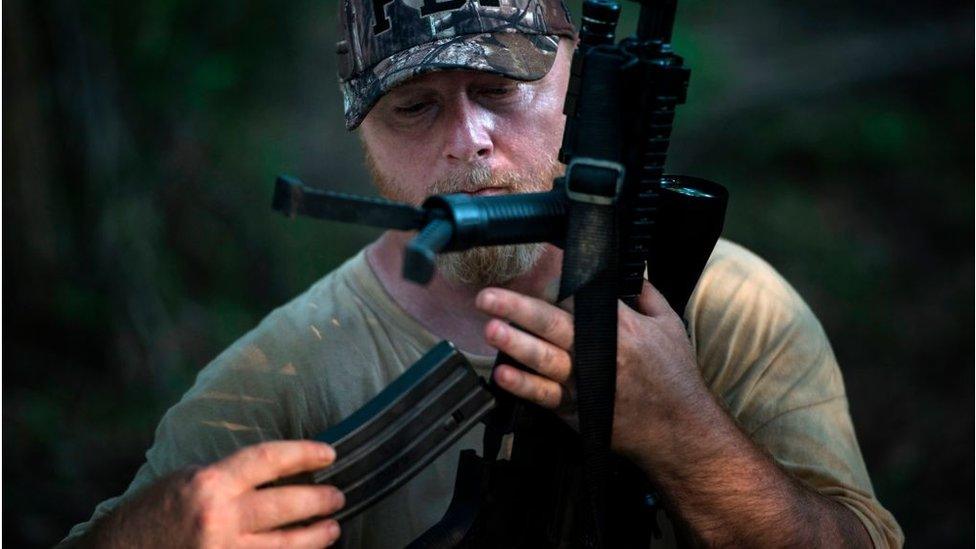Michigan Gov Gretchen Whitmer was 'moved around' as FBI tracked militia 'plot'
- Published
"Hate groups heard the president's words... as a rallying cry": Mrs Whitmer calls out Trump
Michigan's governor was kept updated about a plot to abduct her and was moved around as the FBI tracked her would-be kidnappers, the US state's attorney general has revealed.
On Thursday the FBI said it had thwarted the plot by alleged militiamen who planned to hold a "treason trial" for Governor Gretchen Whitmer.
A total of 13 men have been charged.
Strict measures against coronavirus in Michigan have made Governor Whitmer a target for Covid-19 sceptics.
On Friday Attorney General Dana Nessel told CBS news: "At times, she and her family had been moved around as a result of activities that law enforcement was aware of."
Ms Nessel said the Democratic governor had been kept updated about the investigation in recent months.
The suspects came close enough to executing their plan that police had to move in "before anybody lost their lives", she added.
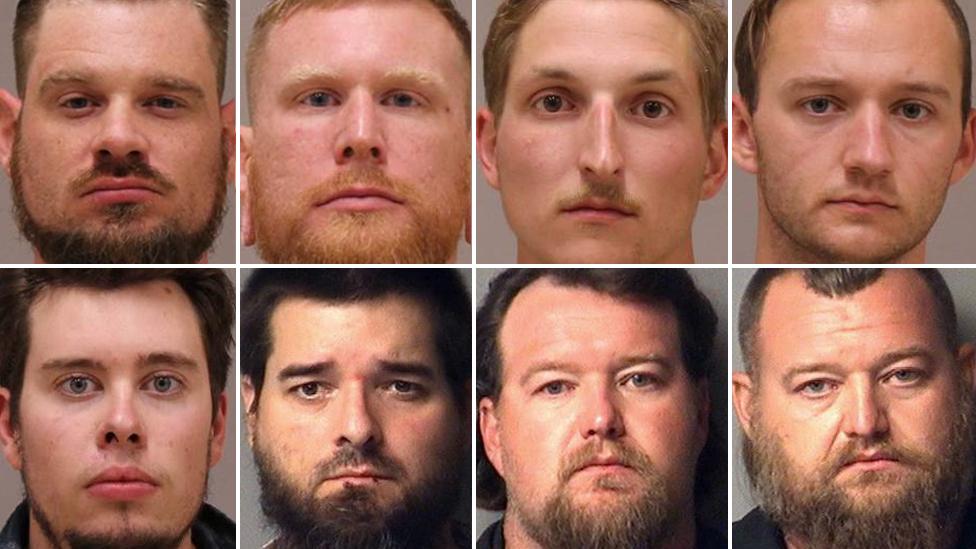
Top (L-R): Adam Fox, Brandon Caserta, Daniel Harris and Kaleb Franks. Bottom (L-R): Ty Garbin, Eric Molitor, Michael Null and William Null
What were they allegedly planning?
According to a sworn FBI affidavit released on Thursday, an undercover source attended a June meeting in Ohio, where a group of Michigan-based militia members discussed overthrowing state governments "that they believed were violating the US Constitution".
Officials say the alleged plot involved kidnapping Mrs Whitmer from her holiday home
In one video, a suspect denounced the state's role in deciding when to reopen gyms during the coronavirus lockdown.
The men met in a basement that was accessed by a trapdoor hidden under a rug, investigators said.
Six men - five from Michigan and one from Delaware - are accused in federal court of plotting the kidnap.
These six were named as Adam Fox, Barry Croft, Kaleb Franks, Daniel Harris, Brandon Casert and Ty Garbin. Mr Garbin's residence, in a trailer park, was raided by authorities on Wednesday.
The other seven face charges of terrorism and gang-related offences in state court in connection with the alleged abduction plot.
They are Paul Bellar, Shawn Fix, Eric Molitor, Michael Null, William Null, Pete Musico and Joseph Morrison.
Michigan protesters were some of the most vocally opposed in the US to lockdown measures
The group wished to gather about "200 men" to storm the capitol building and take hostages, including the governor. They hoped to enact their plan before the November presidential election. If that failed, they planned to attack the governor at her home, officials said.


Social media's Boogaloo problem
It's been reported that these men have links to a militia group called the Boogaloo Bois. This is a movement that has grown online.
It's actually quite hard to describe the motives of the group. It's not "right-wing" in a traditional sense. Members of the movement are vehemently against law enforcement - some have been arrested for killing police officers.
Broadly speaking, they are extremist libertarians - think Timothy McVeigh, the Oklahoma City bomber, but with guns.
The term "Boogaloo" is usually a reference to a civil war. They have an entrenched hatred of big government - confusingly they are also often pro-Trump, though not exclusively. Hence why their ire is often focused on state rather than federal government.
Social media took a long time to act on Boogaloo. Facebook removed a number of Boogaloo groups in June - including the group that these men were allegedly part of. I showed TikTok of a series of Boogaloo videos that were on its platform back in July. Even now it's very easy to find Boogaloo videos on social media - the hashtags they use often change so it's hard to keep up.
This story shows how important it is to monitor social media platforms for extremist content - before it leads to violence.

What has the governor said?
In a news conference on Thursday, the governor tied the plot against her to the rhetoric of President Donald Trump, who she said had spent months "stoking distrust, fomenting anger and giving comfort to those who spread fear and hatred and division".
According to social media posts cited by US media, some of the suspects have previously expressed support for Mr Trump, though one of the militiamen had called the president "a tyrant", adding "every single person that works for government is your enemy, dude".
In April, Mr Trump had backed anti-lockdown protesters, tweeting "LIBERATE MICHIGAN". A month later, armed protesters opposed to the lockdown stormed the state capitol.
Michigan's attorney general confirmed on Thursday that two men photographed at that May protest are among the arrested plot suspects.
On Thursday night, Mr Trump, a Republican, sought to take credit for federal investigators eliminating the alleged threat to the governor.
"Rather than say thank you, she calls me a White Supremacist - while Biden and Democrats refuse to condemn Antifa, Anarchists, Looters and Mobs that burn down Democrat run cities," he tweeted.
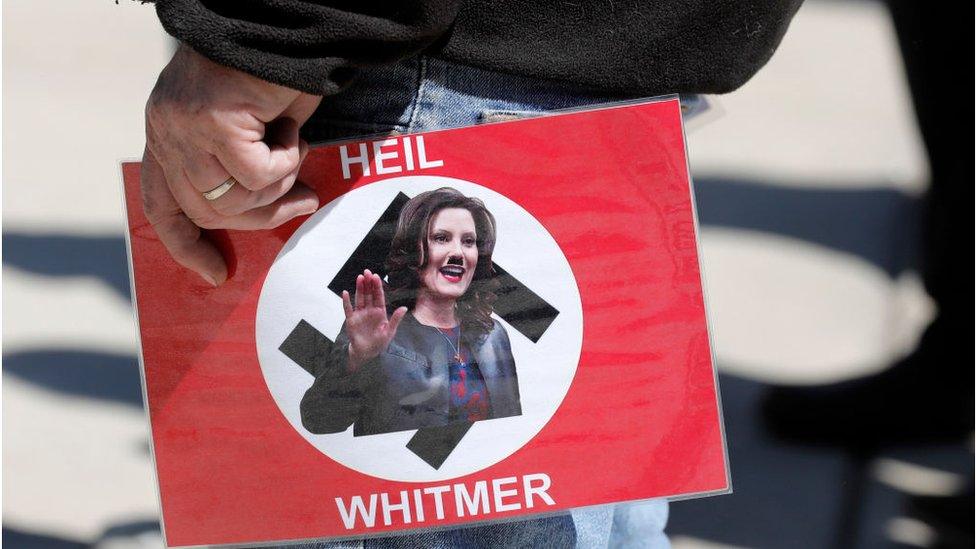
Anti-lockdown protesters have referred to Mrs Whitmer as Hitler
Michigan could prove pivotal in the outcome of next month's US presidential election.
Joe Biden, the Democratic White House challenger to Mr Trump, condemned militias as "a genuine threat" and said Mr Trump's "liberate" tweet encouraged militias. "The words of a president matter," he said, adding: "Why can't the president just say stop, stop, stop, stop?"
Numerous violent incidents have been linked to citizen militia groups across the US in recent years.
Adherents, who are often white men, sometimes brandish weapons during protests. The Department of Homeland Security warned this week in an annual report that violent white supremacy was the "most persistent and lethal threat in the homeland".
- Published9 October 2020
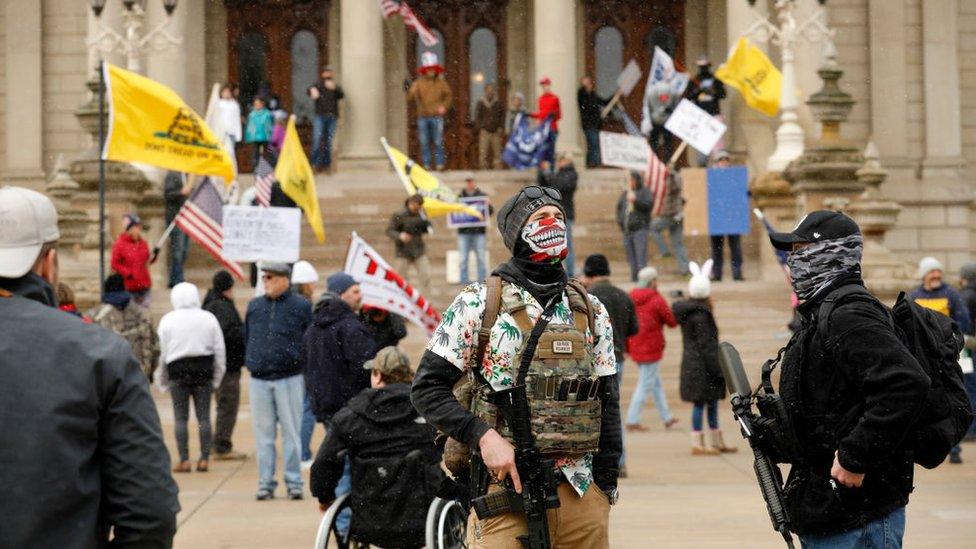
- Published1 October 2020
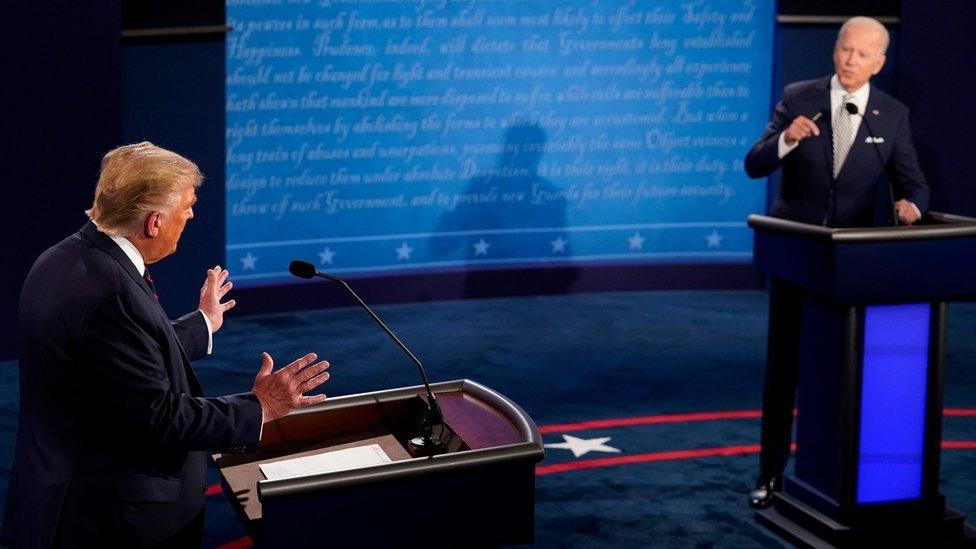
- Published23 April 2019
